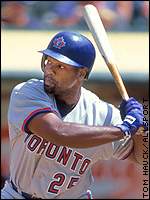I was looking over some individual player statistics the other day a came across something interesting.
I found three guys - Player A, Player B and Player C - whose numbers, I thought, warranted closer examination:
Player A had a pretty good year:
BA: .272; OBP: .377; SLG: .571; Runs: 113; Hits: 156; HR: 44; RBI: 134; BB: 86
Player B also had a pretty good year:
BA: .281; OBP: .391; SLG: .538; Runs: 89; Hits: 160; HR: 39; RBI: 110; BB: 103
Player C hit it out of the park:
BA: .333; OBP: .438; SLG: .630; Runs: 116; Hits: 191; HR: 47; RBI: 148; BB: 127
Player C clearly had the best year of the three. But what about Players A and B? Who had the better year?
Player B had the better pure hitting year - higher average, higher OBP and more walks. But Player A made his hits count more, getting five more home runs, 24 more RBIs and scoring 24 more runs.
So, I'd say Player C had the best year, Player A had the second best year and Player B came in a close third.
Then again. . .
Player A is Carlos Delagado in 1999.

In 1999, Delgado's .272 batting average did not earn him a spot in the top ten of league leaders (Garciaparra led the league at .357 and R. Palmeiro was #10 at .324). Similarly, his OBP (.377) was nowhere near #10 for the league (Garciaparra at .418). Delgado's power (SLG .571) earned him the #8 position for slugging, though he was far behind Manny Ramirez's league leading .663.
Delgado's runs (113) and hits (156) fell short of the #10 spot of the league in both categories (Juan Gonzalez #10 at 114 runs, and Shawn Green #10 at 190 hits). But Delgado's power and production earned him #3 spots for homers and RBIs, behind Griffey and Palmeiro (48 and 47 home runs) and Ramirez and Palmeiro (165 and 148 RBIs). Delgado's 86 walks put him ten shy of #10 on the leader board.
Delgado didn't show up a lot on the leader board, but he produced with a solid average and great power.
I'd give a lot to have Player A's year.
But I'd give more to have Player B's year.
Player B is Harmon Killebrew in 1966.

In 1966, Killebrew's .281 average put him at #5 for the league, behind Frank Robinson's league leading .316, but ahead of Yaz's #10 average of .278. Killebrew's OBP of .391 put him at #3 behind Robinson's league leading .410, and just behind Al Kaline's .392. Killebrew's power (SLG .538) put him again behind Robinson's league leading .637, but at #2 and ahead of Kaline's .534. From a leader board perspective, Killebrew's #5 BA, #3 OBP and #2 SLG beats Delgado's #8 SLG. And it doesn't end there.
Killebrew's runs (89) and hits (160) earned him the #8 position for the league, behind league leaders Robinson (122 runs) and teammate Tony Oliva (191 hits). Killebrew was #2 to Robinson's league leading 49 homers (Killebrew at 39) and Robinson's league leading 122 RBIs (Killebrew at 110). Harmon could take heart in the fact that he beat the triple crown winner in walks, leading the league at 103 compared to Robinson's 87.
To sum up: Killebrew was within the top five in the league for batting average, on-base percentage, slugging percentage, home runs, RBIs and walks. Delgado, for home runs and RBIs. Killebrew also made it on the leader board for runs and hits. Delgado beat Kellebrew in the number of doubles each hit 39 to 27, but both ended up #10 on the leader board for that category.
So who had the better year, Player A or Player B? Killebrew or Delgado?
Here's another perspective. Player C's numbers are the numbers for the player's in 1999 who held Killebrew's positions on the leader board in 1966; e.g. the player in 1999 who was #5 on the leader board for batting average (Killebrew's spot in 1966), hit .333.
Does this mean that Killebrew would have had Player C's year if his 1966 year were played in 1999? Absolutely not.
But the leader board analysis does indicate that Killebrew was more valuable in 1966 than Delgado was in 1999, despite Delgado's better raw numbers. And the MVP voting indicates the same thing.
In 1966, Frank Robinson (triple crown winner), Brooks Robinson and Boog Powell took the numbers 1, 2 and 3 spots in MVP voting. Three Orioles dominate the voting in a year when the Orioles win the World Series in a sweep. No big surprise.
Spots 4, 5 and 6 were the domain of the Twins, the number 2 team of league, with Killebrew, Kaat and Oliva, respectively. Killebrew had 96 MVP points in the voting, and, realistically, had a better year (offensively) than the other Robinson. He and Boog Powell had roughly equivalent years (offensively).
Delgado made it to #12 in MVP voting with 16 points. He fell behind winner Ivan Rodriguez, Pedro Martinez, Roberto Alomar, Manny Ramirez (whose 1999 year looks similar to Killebrew's 1966 year on the leader board), Rafael Palmeiro, Derek Jeter, Nomar Garciaparra, Jason Giambi, Shawn Green, Ken Griffey, Jr. and Bernie Williams.
Despite the fact that Delgado's raw numbers are more impressive than Killebrew's, when compared to the performance of others in the year they produced those numbers, a strong argument can be made that Killebrew's 1966 was better than Delgado's 1999.


No comments:
Post a Comment